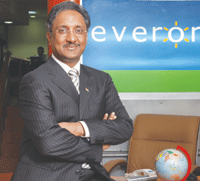P. Kishore, the promoter-managing director of Everonn Systems India Ltd, (ESIL), was interviewed by Dilip Thakore in Chennai. Excerpts:
Everonn Systems India ltd (ESIL) is a very successful business enterprise doubling its sales revenue and net profit annually. What are the major factors behind this impressive growth record?
 I believe the major factors behind ESIL’s rapid growth are our innovative and pioneering efforts in using technology effectively for education delivery; the ever increasing demand for quality education; the company’s investment in creating quality content and good teachers; government thrust on education and increased spending on ICT projects; and our effort to implement education projects at the grassroots levels. In fact, taking technology to the grassroots is our mission.
I believe the major factors behind ESIL’s rapid growth are our innovative and pioneering efforts in using technology effectively for education delivery; the ever increasing demand for quality education; the company’s investment in creating quality content and good teachers; government thrust on education and increased spending on ICT projects; and our effort to implement education projects at the grassroots levels. In fact, taking technology to the grassroots is our mission.
Yet despite its impressive track record, everonn has maintained a low public profile. Why?
It’s true we haven’t used the route of advertisement and publicity for growth. Our growth has been by demons-trating to schools, colleges and governments how our services can make a difference and by implementing projects diligently.
Moreover, until a couple of years ago, we were offering our services only in southern India. But today we are into schools, colleges and universities in almost all the states right from Jammu & Kashmir to the Andaman & Nicobar Islands.
Majority opinion in India is opposed to the “commercialisation of education”, What’s your comment?
In the contemporary knowledge era, high quality education is of critical importance for a country’s growth and development. The quantity and quality of India’s educational institutions is far from sufficient for our large and diverse population. Therefore private partici-pation is the need of the hour.
People who oppose private sector participation do so for fear that admission norms and education outcomes will be compromised. But these fears are unfounded. Policy makers can protect the public interest by framing intelligent policies and regulations.
With 450 million children (below 18 years of age) in India, quality education for all (QEFA) is a massive challenge. What’s your prescription?
The country’s QEFA challenge can be met in three ways. First, we need to increase our reach — to take education to children rather than have children search for quality education. Technology, particularly Vsat and other connecting technologies makes this possible.
Secondly, the system needs to produce high quality, dedicated teachers and remunerate them adequately, so they remain in the profession for longer periods of time. Finally, we need to relook at education content across the board, supplement it with pedagogies which will empower future generations to be creative, innovative and ready to develop new knowledge.
On January 23, you will be unveiling Everonn’s Educating India project. What are its objectives?
Educating India is an initiative designed to realise our vision of transforming and revolutionalising the educational landscape of India.
Through this project ESIL will champion the cause of setting up technologically enabled schools, colleges and vocational institutes of all categories in each administrative block of India. Our objective is to equip India with the finest institutions of education which will prepare our children to confront and overcome the formidable challenges of the 21st century.
The Educating India initiative aims to invite all Indians — in India and around the world — who want to be involved with this nation building exercise, and provide them with options to invest and co-own educational institutes of their choice in India. To this end Everonn will serve as an aggregator, facilitator and manager of this unprecedented initiative.